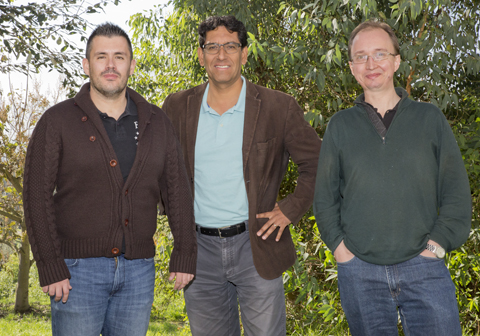For the purpose of furthering quantum computing and artificial intelligence, and the development of quantum technologies, the United States Department of Energy will be allocating just over three million dollars to three research teams, one of which belongs to the UPV/EHU. The UPV/EHU's Quantum Technologies for Information Science (QUTIS) group, led by Prof. Enrique Solano, will be participating in the project alongside two other research teams, one from the University of Washington and the other from the Oak Ridge National Laboratory (ORNL) in the United States.
The QUTIS group is set to participate in a project funded by the United States Department of Energy
The aim is to advance digital-analogue quantum simulation thought up by the think tank of the UPV/EHU-University of the Basque Country
First publication date: 07/11/2017

Dr. Pavel Lougosvki of the ORNL will be coordinating the project which is seeking to develop advances in quantum simulation by bringing together two seemingly contradictory concepts: the digital and analogue concepts. Digital-analogue quantum simulation and other core ideas in the project have been proposed and created in a pioneering way by the UPV/EHU's QUTIS group.
"Most of our ideas and proposals have been verified in the major R&D labs and companies in quantum computing across the world. This is why our ORNL colleagues have called us for these interdisciplinary projects of the DOE (Department of Energy)", explained Prof. Enrique Solano, head of the QUTIS group, and together with Dr. Lucas Lamata, one of the UPV/EHU's leading researchers scheduled to participate in the research.
The core aim of this project is to come up with creative solutions for critical problems in the design of materials, chemical compounds and fundamental phenomena in elementary particles and quantum chromodynamics. "To achieve this, we will be making use of the available licences of various cloud-based quantum computers and interdisciplinary collaboration with experts from the ORNL and the University of Washington in Seattle," explained Solano.
Solano highlighted the fact that the DOE grant will enable highly qualified people to be recruited. So the researcher Dr. Mikel Sanz will be recruited with the funds allocated to carry out the main developments and contributions.
The project will also put the QUTIS group permanently in contact with the University of Washington and the ORNL for years to come, besides facilitating access to the world's most powerful cloud-based quantum computers. "The teams at the University of Washington and the ORNL have great experience in the use of supercomputers, in theories relating to materials, elemental particles and quantum chromodynamics for nuclear physics. They also have young teams in quantum computing and quantum simulation who will be working hand-in-hand with us over the coming years," explained Solano.
The Ikerbasque Professor stressed that "interdisciplinary work is crucial nowadays and even more so in the global effort and high degree of competition involved in driving forward quantum technologies and quantum computing in particular."
Seeking scientific applications
The project in which the UPV/EHU is participating will be developed in parallel with and in collaboration with another project to which the DOE will be allocating an additional 7.5 million dollars. This project will also be coordinated by the ORNL. Led by Dr. Raphael Pooser, it will use cloud-based quantum computers, of both D-Wave Systems and IBM, to resolve basic problems and develop applications of use in quantum computing. "Our working team at the UPV/EHU will have direct access to all these quantum computers via the cloud over the Internet," announced Solano.
The aim of these interdisciplinary projects is to seek scientific applications in various fields of study: quantum field theory, quantum chemistry, design of new materials, microscopic models of matter, machine learning, artificial intelligence, biomimetic quantum computing, among others.
The UPV/EHU's Quantum Technologies for Information Science Group, www.qutisgroup.com, is a creative think tank in quantum technologies; it is highly influential worldwide and collaborates with academic and scientific institutions in the United States, Canada, China, Australia, Singapore, Japan, the United Kingdom, Germany, Switzerland, Sweden, and the Netherlands, among others. QUTIS is a global leader in quantum computing and quantum simulation. "We are also pioneers in quantum biomimetics and neuromorphic quantum computing, as well as in ultrastrong light-matter coupling, quantum artificial intelligence and quantum machine learning. We believe that the 21st century is going to require the interdisciplinary union between biological processes, intelligent processes and quantum technology," stressed Prof. Enrique Solano.
Further information about the QUTIS Group is available at: www.qutisgroup.com

